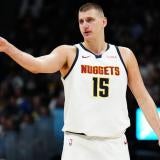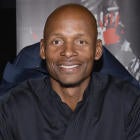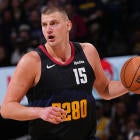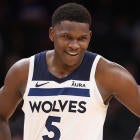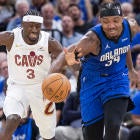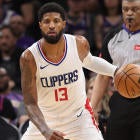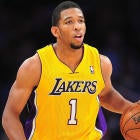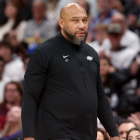
It's a partly cloudy Monday afternoon in Miami, and Ray Allen sits in his car. He's cruising down the highway to pick up two of his sons from basketball practice.
Since the last NBA game he played in -- a 2014 Finals loss to the San Antonio Spurs -- Allen has been able to watch his children fall in love with the game that he ruled for 18 years. He even got to coach his 14-year-old son last season.
When asked if he's ever thought about taking those coaching talents to the NBA, the Hall of Famer doesn't hesitate: "All the time," he tells CBS Sports. "But I don't want to have any regrets when it comes to parenting… I don't ever want to look at any of my children and say, 'Man, I actually don't know you.'"
It's a pitfall Allen has avoided with his five kids, unlike many of his former colleagues in the NBA who missed out on those formative family experiences. Sacrifice, in life, on the basketball court, is something the 10-time All-Star has always seemed to appreciate … and reap the benefits of.
When joining Paul Pierce and Kevin Garnett on the Boston Celtics in 2007 to form the modern-day NBA's first "big three," he sacrificed offensive production for a chance to win. In 2012, after signing with the Miami Heat to partner with LeBron James, Dwyane Wade and Chris Bosh, Allen checked his ego at the door and took on a new role (role player) for a chance to win.
The result? He won. Two chips. Oh, and he knocked down the most clutch 3-pointer in NBA history -- a shot James still thanks him for sinking on a regular basis, according to the legendary sharpshooter.
While many of his contemporaries retired to become basketball analysts on TV, Allen has elected a more grassroots approach to voicing his opinions. On Instagram, he insightfully muses about race, politics, golf, and even his partnership with Abbott and the FreeStyle Libre 2 device -- designed to help those afflicted with Type 1 Diabetes (like his son, Walker).
Still also very much plugged into the NBA, Allen spoke to CBS Sports about LeBron James' continued dominance, failing to convince Kendrick Perkins and K.G. to join him for pedicures, Kyrie Irving's decision to take time away from basketball, and more.
The following Q&A has been edited for clarity, flow, and length from two conversations.
CBS Sports: If not for some technical difficulties, my plan was to have my Zoom background be a photo of you hitting that iconic 3-pointer against the Spurs in 2013. Do LeBron or Coach Spo [Erik Spoelstra] ever call you out of the blue to thank you for knocking down that shot?
Ray Allen: Oh yeah, they do. They definitely do. And I owe them a debt of gratitude for accepting me into the fold. They already had a championship environment, and to welcome me in to help them get to the next level, that's what true winners do. They always continue to find ways to win by any means necessary. They're always willing to learn and get better. There hasn't been a year that's gone by where either one of them hasn't mentioned 2013 to me. They're always grateful for my input.
So what's the conversation like? Do they say, "Hey man, thanks for saving my ass in Game 6?"
RA: It's always just words of affirmation. When you win on any level -- I always try to impress this upon kids that I speak to -- it immortalizes you. You'll forever be talked about. You're part of the history of the game in that organization that you've won with.
Staying on LeBron for a second here ... He's in Year 18. Thirty-six years old. He had 46 points a couple of weeks ago against the Cavs. Are you surprised that he's still dominating in the way that he is?
RA: Not at all, because the first half of a person's career -- typically in any sport -- if you didn't take care of business, you're done. Your first half is going to be your full career. For LeBron and his first half, he stretched, he lifted, he ate well, he had people employed in every one of those aspects.
Russell Wilson talked about spending $1 million a year on a massage therapist. If you're making $20-plus million a year, the main reason why you've gotten that contract is because you're in great physical condition. So you've got to contribute to the root cause that allows you to continue to play. If you don't take care of your body, then you can't play for very long. If you don't play for very long, you don't make much money. That expense is totally necessary to perform at a high level for a long time.
That seems to be a big similarity between the two of you, that focus on self-care. Something you've always emphasized is taking care of your feet, which as a basketball player, makes a ton of sense. What was it like trying to convince teammates to join you for pedicures?
RA: I was often criticized for going to get pedicures, either by my teammates or people in the salon when they saw me come in there. Women used to say, "Ah, you getting a pedicure, I need to tell my husband, 'Guess who I saw getting a pedicure?'"
I constantly would take my teammates. There was a trip that we took to L.A. when I was playing with Miami, and I took LeBron to this place in Beverly Hills. We got our feet done, and the pictures I posted on my Instagram went viral because I took a selfie with 'Bron over my shoulder, and he made one of his goofy faces. But they gave a great foot massage and shoulder rub, and I just don't understand the stigma attached to a man having his feet taken care of.
Just another outdated stigma, huh?
RA: What you have to always remember is everywhere you've gone in your life, your feet have taken you there. How do you not take care of them in the process?
I used to always impress upon my teammates to take care of their feet. You get an ingrown toenail, you can't play. You get plantar fasciitis, you can't play. God knows you needed a chainsaw sometimes with my feet because of the callouses. So many things can keep you from doing your job, and that's just one of the things you gotta stay in front of so you can't be ruled out. No. 1 key to being successful is being available. And all those things contribute to your availability.
Now I'm imagining a lineup of salon chairs with you, K.G., Perk, and Paul sitting next to each other, reading magazines. Would they join you on these trips?
RA: That would be a no. Those are three guys that used to think it wasn't manly. They said they'd never do it. So once I heard that, I let them be. But for the most part, every teammate that I've ever asked to go get a pedicure with me, they all went.
Something else that falls into the realm of health is the new Abbott System -- the FreeStyle Libre 2 you're promoting. It sounds like a real game-changer for anyone with diabetes. Can you tell me a little bit about it?
RA: My son Walker has Type 1 Diabetes, and what happens is whenever he eats anything with sugar, his pancreas doesn't convert it into energy, so the sugar stays in his bloodstream and it creates a poisoning effect. What we have to do is give him insulin to dissipate the sugar. Sometimes when he eats, his sugar goes extremely high and we don't know it. And then sometimes when he hasn't eaten in a while, it goes extremely low. So we'd have to prick his finger and check his blood constantly to see where his blood sugar is. Even when he's just sitting there. Middle of the night, check his finger. When he first wakes up, check his finger. Every time before he eats, we needed to check.
That sounds like such a pain, literally for him, but also for you guys monitoring.
RA: Yes it was. The FreeStyle Libre 2 allows us to not have to prick his finger. We could just hold the monitor up to the device on his arm and it tells us where his blood sugar is. And more importantly, it gives us a reading if it's trending upwards or downwards so we can be on the lookout. There's an alarm setting too that goes off if his blood sugar gets too high or too low. So it's a game-changer.
Now when he's playing basketball, he doesn't have to run to us and get his finger pricked. He could just hold up his device to his arm, and he sees right away. He could tell us across court that his number is fine or whatever it is. It just gives us relief and confidence moving forward that we can live a little bit easier and freer, and allow him to have a bit more breathing room when it comes to dealing with his diabetes.
There's actually a 14-day trial on freestylelibre2.us and you can sign up to see if the technology is right for you.
Shifting back to LeBron for a second, he's mentioned "chasing" Michael Jordan in the past. As someone who's played with 'Bron and competed against M.J., do you feel like LeBron has "caught" him? And if not, what would it take for LeBron to surpass Michael as the GOAT?
RA: I never thought it was about a game of cat and mouse or tag. Michael Jordan, he propped up this league, and he allowed it to grow. He had such an impact on [the NBA] and other sports leagues, not only in this country but around the world, where he made it very popular for corporations to bring on athletes as endorsers to grow their product. It didn't happen before Michael Jordan. Michael Jordan made it acceptable across the spectrum. So the things that he's done, we are forever indebted to him, similar to Tiger Woods in golf.
Michael Jordan played a different game than LeBron does, he played in a different era. Statistics never equate when you compare across eras because the game is so totally different today than it was back in the '90s.
Who would you say is the GOAT, then?
RA: In my opinion, M.J. is the GOAT. LeBron is a product of M.J., so a lot of what's in LeBron -- in his DNA -- comes from Michael. For anybody that says that LeBron is the GOAT, they're growing up in today's era, and they believe what they believe based on how it feels and what he means to them, and that's OK. But the way M.J. affected the game, man, he had a stranglehold on the league and he struck fear in everyone because he was an unstoppable player.
Keeping the GOAT talk going, Steph Curry recently passed Reggie Miller on the all-time 3-pointers list. You gave him a nice shoutout on Instagram as he approaches your mark. As a legendary marksman yourself, where do you think he ranks among the greatest shooters ever?
RA: I think it comes with categories when you talk about shooters. Steph is in a category of his own, the way he plays the game. When I think about shooters, someone like Klay Thompson comes to mind. He's more in the realm of how I shot, how Reggie [Miller] shot -- coming off screens, moving without the ball.
Steph is more on the ball, the point guard shooter. So it's a different approach to the game. He's an extremely incredible ball-handler, so it's a different mentality when you're handling the ball and not coming off screens. But I look at Reggie Miller and what he did -- run off screens and just the fluidity of the game when he played it. For me, he was somebody I always looked up to and thought was amazing at how he performed his tasks.
So for you, Reggie, not Steph, is the GOAT shooter?
RA: Yes, Reggie [is the GOAT] because of the way he set the game up, the way he played the game. Obviously, I incorporated a lot of who he is into how I played. He was the standard-bearer. Without him, we don't have a formula for moving forward. So that's how I view it because it allowed me to do the things that I was capable of doing.
You're a real educator on Instagram. You've got this big library of saved stories that touch on issues related to race, politics, and in many of them, you're sharing knowledge about what you've learned. Have you ever thought about applying that teaching to coaching? In the NBA?
RA: Yeah, all the time. Right now, the thing that I try to stay dedicated to are my children because I have four young boys. They really need me now: 16 years old, 14, 11, and nine. Last year, I coached for my now-14-year-old, and just to be around their games, to be around the house with them, work them out, that to me is more important than anything else. Because if I become a coach of any team, that means we've gotta move, and it means that I'm gonna be gone out of the house more than I'm at home. I don't want to rob them of the experience of having a dad in the house every day of the week.
So we're gonna have to wait until it's an empty nest situation before we see Coach Allen?
RA: Yeah, cause right now I realize I can't ever get this time back, and I don't want to have any regrets when it comes to parenting. It's one thing to have a regret when you play a sport, but to have a regret as a parent, you see your kid grow up and you look back and you say, "Man, I actually don't know you." I don't ever want to say that about any of my children, so now it's the sacrifice of making sure that I'm home with them.
Speaking of sacrifice, let's talk big threes. As someone who's not a stranger to those and the sacrifice that comes with them, do you think the Nets, as currently constructed with K.D., Kyrie and James Harden, are title favorites?
RA: I believe they have the talent to win the title, but winning the title is so much more than just an assemblage of players. When I look at the teams I played on, some of the most important players for both championship years were P.J. Brown, Sam Cassell, James Posey, Eddie House, Leon Powe. And then James Jones, Mike Miller, Juwan Howard, Udonis Haslem, Shane Battier. Guys that took charges, guys that didn't care about their stats.
That is what will determine the elevation of this Nets team; not the best players they have, but the guys around them -- that encourage them to play better, that push them to play harder to do the things that bridge the gap. Some games are going to require someone aside from Kyrie, Kevin or James to hit a shot to allow them to win a game, and they have to be OK with that. They have to be willing to put other people in those positions. That's what makes a championship team, when you have a big three like that.
You, K.G. and Paul meshed so well together in Boston. With the Nets trifecta, they're all scorers, and they need the ball in their hands. But they've been great recently. Do you think they'll mesh when it matters?
RA: They're definitely all ball-dominant players, but I really think they can do anything. From what I've seen from each of them is that they're very basketball savvy. High basketball IQs. Now the question is, are they gonna do it and compromise what it is that they've done over their careers to get to the next level?
The dynamics with those three are very different from myself, Paul and Kevin. We were hungry in 2007-08 and we hadn't won until then. Now, in the situation with these Nets, Durant has already won twice. Kyrie once. Harden hasn't won any, so he doesn't know what it takes to get to that Finals level. Are Durant and Kyrie hungry enough to concede to each other? They might be, but I'm not sure.
As someone who's been an advocate for mental health on Instagram, I want to hone in on Kyrie a bit more. He recently took some time off from playing for personal reasons. He "needed a pause," he called it. What did you make of his decision?
RA: It's interesting because when "The Last Dance" was on a few months back, players commented on Dennis Rodman, "Oh, we could take days off like that? You could go to Vegas with no repercussions?" But it's like no, that was just Dennis Rodman. He had a special bond with his team and with Phil Jackson because he came to work and was a seasoned veteran. People gave him that right, and that doesn't work for everybody. A lot of teams aren't mature enough to handle that.
Kyrie has had somewhat of a topsy-turvy relationship with the media and his teammates -- what he decides to talk about and what he decides not to talk about. In order to be a leader, you have to do the unpopular things, but the right things, and you can't pick and choose when to do them. Once [Kyrie] does those things more consistently, that's when people will respect his decisions.
He's one of the best players in the league, and arguably one of the all-time best one-on-one players. Certainly the best handles. All that stuff is there, but to be a leader and for young players to look up to him, he has to be consistent in his habits.
When you mention his topsy-turvy relationship with the media and teammates, are you referring to his time in Boston?
RA: Yes, he's had issues before in his locker rooms. So you have to follow what his history has been. Regardless of what it is that [Kyrie] was dealing with, he left you guys to speculate … If you don't speak to the media, they're gonna write their own stories. So give them the time. Be professional. This is part of your job. Players today think the media is out to get them.
Really, it makes everyone's job so much easier when you have a cordial relationship with the media where everybody is exchanging information and you understand where a person is coming from … If he's just in his intentions, then he has nothing to worry about.
The media helps bring attention to the game and grows who sees the game and how to access it. Players back in the '80s and '90s gave that ability to the players now to have international access by traveling overseas, doing interviews, doing camps in Europe and Asia. So the guys now reap the benefits from that. It's important for them to continue that same tradition of being transparent with the media and allowing people to get to know them. That's why the game is successful like it is.
Do you feel that if Kyrie was more direct from the get-go about what was going on and why he was stepping away -- to focus on his mental health, maybe reflect on the Capitol riots, buy George Floyd's family a house -- that would have made his decision to take a couple of weeks off more acceptable in your eyes?
RA: I come from a generation where I could never sit out because my teammates were playing, and I was going to battle with these guys. I wanted them to know I was always there with them. I never wanted them to feel like they couldn't count on me from one game to the next. I also didn't want to let a kid down who came to the game and found out I wasn't in the lineup. My generation, we felt strongly about that. We wanted to be iron men, counted on, because at the end of the day, if you wanted to leave a legacy in the game … you belong on the court. This is what you signed up for.
As a kid, you'd never say you wanted to take time off and not play in every game. You'd say, "Just give me an opportunity, and I'll take advantage of it, and I will never take any shortcuts." But what happens is, you get into it and make money, and then you change. You want people to cater to you, you want people to kiss your butt, and you think you get to control the narrative. But you have to always remember that your sense of entitlement can't overcome your sense of appreciation.
It's almost a chicken and the egg situation though, right? Like Kyrie would probably argue that the media is what has pushed him away from speaking, but the media would argue that Kyrie doesn't give it the time of day.
RA: As athletes, we want to be able to be the man. We want to be able to be counted on to do the job and to perform at a high level. With that comes responsibilities. A lot of guys don't want some responsibilities.
I can recall over the course of my career, on Christmas Day games, being the man on the team to address the crowd. Honestly, I didn't really want to address the crowd. I'm getting ready for a basketball game. But I'm the guy who ended up doing it because I'm the guy people counted on to do what needed to be done for the team.
You don't want to do these things, but this is just what leaders do. Leaders know that much is expected of them, and they fall on the sword a lot of the time. I don't know if [Kyrie] understands that yet. It's like he doesn't want to take the criticism of things going wrong either in the locker room or on the court, and there's no explanation for it. You can't just talk it away or make it somebody else's fault, or make it seem like you did your job and someone else didn't do theirs.
Over the past couple of weeks, we've honored the life and legacy of Kobe Bryant, who passed about one year ago. As someone who competed against him at the highest level, was part of the same era, is there a memory about him that stands out to you?
RA: I always remember Kobe before we got drafted in '96. He was very excited coming out of high school, and he appreciated being in the situation he was in. [Kobe] lived in Pennsylvania, so he had a connection to Big East basketball. We had a conversation on the bus going to the Draft Combine, and it felt like he was just happy to get drafted.
That's what I'll always remember about him: Regardless of what he achieved, he was a man with excitement and zeal for life.
On James Posey's podcast, you recently shared this awesome trash-talking story that involved Garnett and Joakim Noah. Do you have any similar types of trash-talking stories involving Kobe, who was notorious when it came to that?
RA: Honestly, no. Between me and Kobe, there wasn't any trash-talking. There was a mutual respect. The trash-talking just never happened between us.









